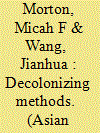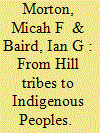|
|
|
Sort Order |
|
|
|
Items / Page
|
|
|
|
|
|
|
| Srl | Item |
| 1 |
ID:
145855


|
|
|
|
|
| Summary/Abstract |
The concept of indigeneity is highly problematic in Asia, where a heightened degree of spatial mobility and ethnic fluidity challenge conventional understandings of Indigenous peoples (IPs) as rooted, stable, and unchanging from time immemorial. As some scholars have argued, however, this conception of indigeneity ignores the fact that many IPs have had multiple experiences of displacement due to their colonization by outsiders. Here, the authors discuss one such group – the Akha minority residing throughout the Upper Mekong Region – that in spite of multiple historical experiences of displacement, marginalization, and, more recently, colonization has maintained an intimate connection with their ancestral homeland. Akha have maintained this connection by way of their ‘intimate place-making cosmographies’, whereby non-Akha space is reconfigured as a microcosmic totality of the larger Akha cosmos. These practices have allowed for Akha to sustain and vitalize their distinct identity as Akha in the face of various external pressures from non-Akha others.
|
|
|
|
|
|
|
|
|
|
|
|
|
|
|
|
| 2 |
ID:
165104


|
|
|
|
|
| Summary/Abstract |
This article presents a chronology of the growth of the concept of Indigeneity in Thailand, analysing the particular ways in which the global Indigenous movement has taken root in the country. In Thailand, transnational support networks and the opening of political associational space played key roles in facilitating the growth of, first, a regional, and later a national Indigenous movement during the 1980s and early 2000s, respectively. Indigenous Peoples in Thailand are asserting their identity by drawing on a new concept of Indigeneity being promoted by the United Nations and other international advocacy organisations that identifies them not only as first peoples, but crucially as colonised or oppressed peoples. Indigenous Peoples in Thailand are further asserting both their cultural distinctiveness and their compatibility with the Thai nation. The Indigenous movement in Thailand differs from movements in Australia, Canada, and the United States where Indigenous Peoples must perform their cultural distinctiveness to maintain political recognition, and in turn are accused of being not different enough when exercising their rights. In Thailand, rather, Indigenous Peoples are accused of being not Thai enough in their efforts to push for any political recognition. While the Thai government denies the relevance of the concept of Indigeneity to Thailand, it is clear that the Indigenous movement in Thailand has grown since the early 2000s. In fact, state policies between the 1950s and early 2000s contributed toward the scaling-up of a pan-Hill tribe identity among the core groups associated with the movement.
|
|
|
|
|
|
|
|
|
|
|
|
|
|
|
|
|
|
|
|
|